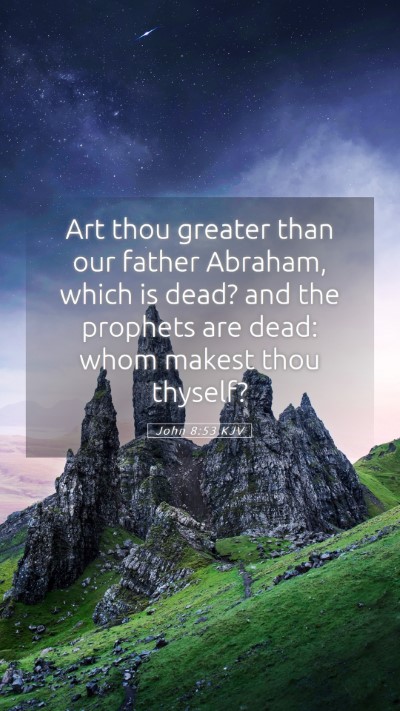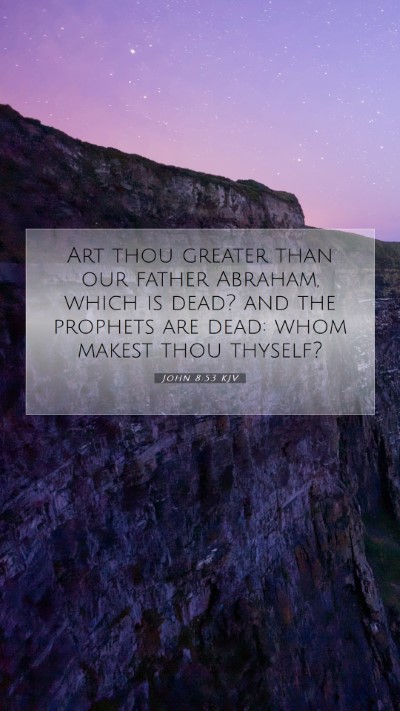Bible Verse Commentary: John 8:53
Understanding the Context
John 8:53 states, “Are you greater than our father Abraham, who died? And the prophets died. Who do you make yourself out to be?” This verse occurs during a heated exchange between Jesus and the Jewish leaders. It illuminates the tensions between Jesus and the religious authorities of His time.
Meaning of John 8:53
This question posed by the Jewish leaders reflects their skepticism towards Jesus' claims about Himself. They were struggling to comprehend His identity and authority compared to revered figures like Abraham and the prophets.
Bible Verse Interpretations
- Matthew Henry's Commentary: Henry emphasizes that the incredulity of the Jewish leaders stems from a misunderstanding of Jesus’ divine nature and His role as the Messiah. They view Him merely as a man and fail to recognize His divine authority.
- Albert Barnes' Commentary: Barnes notes that the leaders' question embodies their disbelief. They equate Jesus with mere mortals, failing to see His divine pre-existence and supremacy. He argues they are bound by their traditions and cannot accept Jesus as anything beyond a teacher.
- Adam Clarke's Commentary: Clarke elaborates on the significance of the figures mentioned—Abraham and the prophets. He suggests that the Jewish leaders’ reliance on these ancestral figures prevented them from recognizing Jesus as the fulfillment of the prophecies and the ultimate heir to Abraham's promise.
Key Themes
- Divine Authority: The verse illustrates the struggle to understand Jesus’ relationship to God and His authority over human traditions.
- Faith versus Tradition: The Jewish leaders' question exposes the conflict between faith in Jesus and the traditional views they upheld.
- Identity of Christ: It promotes a deeper examination of the identity of Christ and the implications of His claims, which leads to larger theological inquiries.
Application of John 8:53
For contemporary readers, this verse inspires questions about personal faith and understanding of Jesus. It challenges individuals to explore how cultural and traditional lenses may affect their perception of Christ. Are there areas in one’s life where tradition blinds faith?
In-depth Bible Verse Analysis
This analysis calls for a closer look at the historical context surrounding John 8. Understanding the first-century Jewish mindset is crucial, as it provides greater insight into the resistance Jesus faced and how His message was radical for its time.
Comparison with Other Scriptures
- Matthew 22:32: "I am the God of Abraham, the God of Isaac, and the God of Jacob." This further cements Jesus' claims about His divine authority and deep connection to the patriarchs.
- John 8:58: “Before Abraham was, I am.” This verse completes the picture by asserting Jesus’ pre-existence and divine nature, reinforcing the claims made in John 8:53.
- Hebrews 7:14: It mentions Jesus' lineage as coming from Judah, thus fulfilling the prophecies related to the Messiah, which further extends the conversation started in John 8:53.
Conclusion
John 8:53 serves as a profound reflection on the misunderstandings about the person of Christ and the implications for faith. Engaging deeply with this verse and its context can enrich one's biblical study insights and enhance overall understanding of Scripture.


